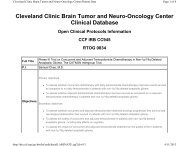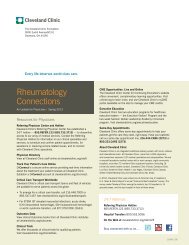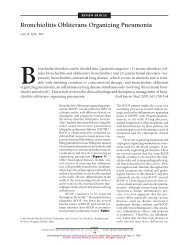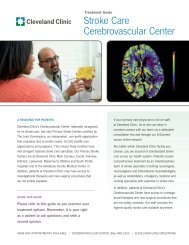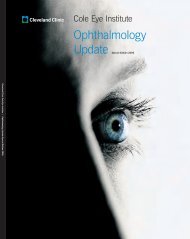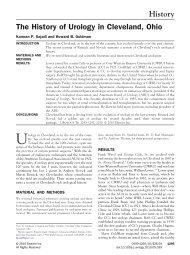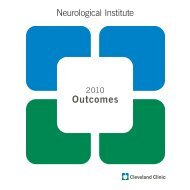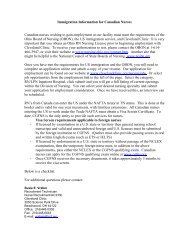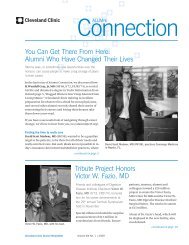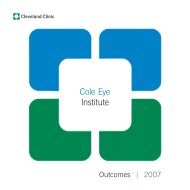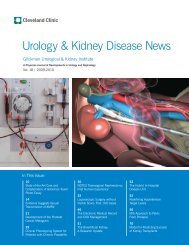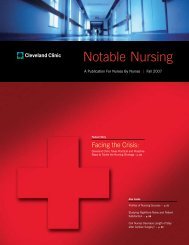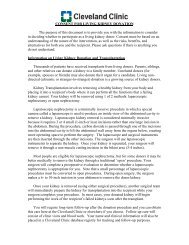Brain Tumor and Neuro-Oncology Center - Cleveland Clinic
Brain Tumor and Neuro-Oncology Center - Cleveland Clinic
Brain Tumor and Neuro-Oncology Center - Cleveland Clinic
You also want an ePaper? Increase the reach of your titles
YUMPU automatically turns print PDFs into web optimized ePapers that Google loves.
16<br />
<strong>Clinic</strong>al Programs (continued)<br />
In 2007, further expertise in endoscopic surgery for<br />
skull base indications was provided with the addition<br />
of Dr. Burak Sade to the Skull Base Surgery Program.<br />
BTNC endoscopic neurosurgeons work closely with<br />
endoscopic sinus surgeons in Clevel<strong>and</strong> <strong>Clinic</strong>’s Head<br />
<strong>and</strong> Neck Institute to provide minimally invasive surgical<br />
management for skull base malignancies, in addition to<br />
pituitary region tumors.<br />
Pituitary <strong>and</strong> <strong>Neuro</strong>-Endocrine <strong>Center</strong> (PNEC)<br />
The <strong>Neuro</strong>-Endocrine <strong>Center</strong> has shown continuous<br />
growth since its inception in 2002, fostered by a<br />
close working relationship among members of the<br />
BTNC <strong>and</strong> the departments of Endocrinology, Diabetes<br />
<strong>and</strong> Metabolism; <strong>Neuro</strong>logical Surgery; <strong>Neuro</strong>-<br />
Ophthalmology; <strong>and</strong> Radiation <strong>Oncology</strong>. The close<br />
relationship has led to the development of highly<br />
integrated clinical care pathways, a common pituitary<br />
tumor research database <strong>and</strong> several joint research<br />
projects (see below).<br />
<strong>Clinic</strong>al Care Pathways<br />
<strong>Clinic</strong>al care pathways define the pre-hospital,<br />
perioperative <strong>and</strong> postoperative care for patients with<br />
secretory <strong>and</strong> non-secretory pituitary tumors. The<br />
development of new pathways has helped decrease<br />
patient length of stay, with equal patient outcomes.<br />
Academic Activities<br />
A prospective IRB-approved database has been<br />
established for all patients with pituitary tumors seen<br />
in the <strong>Neuro</strong>-Endocrine <strong>Center</strong>. Detailed preoperative<br />
endocrine testing, including Cortrosyn stimulation, is<br />
routinely performed for comparison to postoperative<br />
findings. New clinical care pathways have eliminated<br />
the routine use of perioperative steroids, thereby<br />
enabling the accurate determination of postoperative<br />
pituitary adrenal activity. Several retrospective analyses<br />
have been completed <strong>and</strong> are also in progress,<br />
including comparison of Gamma Knife vs. IMRT for<br />
BRAIN TUMOR AND NEURO-ONCOLOGY CENTER<br />
subtotally resected somatotrophic pituitary adenomas,<br />
case review of pituicytoma, an analysis of the impact<br />
of somatostatin on the efficacy of radiosurgery for<br />
somatotrophic adenoma, <strong>and</strong> an evaluation of the role<br />
of radiosurgery <strong>and</strong> postoperative pituitary insufficiency.<br />
Additional collaborative work with groups outside<br />
Clevel<strong>and</strong> <strong>Clinic</strong> has focused on what role mutations in<br />
the aryl hydrocarbon receptor interacting protein gene<br />
(AIP) may play in the formation of pituitary tumors,<br />
especially familial acromegaly (excess growth hormone<br />
secretion due to a pituitary tumor) or in the early onset<br />
of these tumors in the sporadic setting. This resulted<br />
in two publications in 2007-2008: Georgitisi et al,<br />
Proceedings of the National Academy of Sciences<br />
USA (PNAS), 104(10): 4101-5, 2007 <strong>and</strong> <strong>Clinic</strong>al<br />
Endocrinology, 2008, in press.<br />
Teaching of residents <strong>and</strong> fellows has similarly<br />
been augmented through the establishment of the<br />
center. Endocrine residents routinely participate<br />
in outpatient evaluation with endocrinologists <strong>and</strong><br />
surgeons. BTNC fellows are intimately involved in<br />
the outpatient, operative <strong>and</strong> inpatient care of all<br />
patients. <strong>Neuro</strong>surgery residents play a critical role in<br />
the inpatient <strong>and</strong> surgical care of these patients, <strong>and</strong><br />
are frequently able to attend outpatient clinics. A joint<br />
conference involving endocrinology, neurosurgery, neuroophthalmology,<br />
neuroradiology <strong>and</strong> radiation oncology<br />
is held on the first Friday of each month, during which<br />
case presentations <strong>and</strong> management or visiting lecturers<br />
are presented.<br />
In addition, monthly pathology review sessions, where<br />
the pathological findings of each patient are reviewed<br />
jointly by the pathologists, endocrinologists <strong>and</strong><br />
neurosurgeons (the Pituitary Interest Group), continue.<br />
These sessions are open to all interested parties <strong>and</strong><br />
are held the first Monday of the month in the Pathology<br />
& Laboratory Medicine Institute. A dedicated Advanced<br />
<strong>Neuro</strong>surgical <strong>and</strong> Spine Skills <strong>and</strong> Simulation<br />
Laboratory (ANSSSL) has also been developed<br />
through the Pituitary <strong>and</strong> <strong>Neuro</strong>-Endocrine <strong>Center</strong>’s



